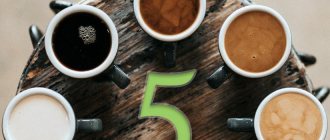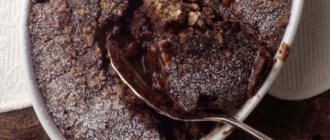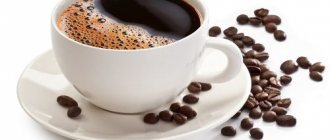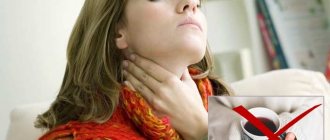Many people are used to washing down their meals with drinks, including coffee. Doctors do not recommend drinking coffee on an empty stomach, and therefore it is logical that they usually end their meals with it. But there are a lot of nuances and features in this issue, and you need to understand what will happen if you drink coffee after a meal, how it affects the body, and what result it can cause. Let's figure out how long after eating you can drink coffee.
Can I drink coffee before meals?
Can I drink coffee before meals?
- Coffee, when consumed correctly, is a very healthy drink. And it’s not just about the invigorating properties. The drink contains nutrients beneficial to the human body. But for them to really be useful, some features must be taken into account. So is it possible to drink coffee before meals?
- Let's say right away that no. Oddly enough, the reason for the ban is caffeine. This substance does not have a very good effect on the mucous membranes of the digestive system, and if a person is hungry, it begins to irritate them greatly. And the most harmless thing you can get from drinking coffee on an empty stomach is diarrhea.
- If you do this regularly, then after a certain time you are guaranteed gastritis. In addition, it is worth considering that bitterness in coffee stimulates the flow of bile. And if you intensify it on an empty stomach, then you will be guaranteed aching pain in the abdominal area.
Side effects of coffee
Nutritionists are confident that it is not coffee that causes harm, but its thoughtless consumption in excess of the recommended norm. They pay attention to its side effects:
- Each cup of coffee stimulates the active production of insulin. With frequent use, the risk of gaining excess weight and obesity increases.
- Caffeine tones the human nervous system, stimulating the activity of brain cells. When in excess, it causes sleep disturbances and increased irritability.
- Coffee is an excellent diuretic that actively removes excess water. If you drink more than 3 cups of drink per day, the loss of a large volume of fluid leads to vasoconstriction. Cellulite appears on the thighs, the skin on the face peels, and surges in blood pressure torment you.
- Frequent stimulation of the nervous system with coffee gradually reduces its response to the tonic: addiction occurs and the opposite effect occurs. A person becomes lethargic, apathetic, and inattentive when working.
- Adding milk protects the gastric mucosa from irritation and improves taste. But the caloric content of the drink and the load on the pancreas significantly increases.
Subscribe to our INSTAGRAM account!
Those who like to drink a cup of coffee after waking up on an empty stomach should remember the risk of damage to the mucous membranes and the development of gastritis. In addition, the aromatic drink stimulates the production of cortisol, in excess it disrupts the functioning of the adrenal glands, and worsens the condition when they are depleted and insufficient.
Can I drink coffee after eating?
Can I drink coffee after eating?
- After reading the previous information, you probably decided that you can drink coffee after meals. In principle, yes, this option is preferable, but even in this case there are some nuances. If you are going to drink coffee after a meal, then do it 30 minutes after your main meal.
- If you drink breakfast, lunch, or dinner with a drink, you will dilute the gastric juice. Due to the fact that its concentration decreases, food will not be absorbed as it should. All this will lead to heaviness in the stomach and bloating. Severe heartburn may also occur. Another nuance that you should always remember is fatty foods.
- If you have eaten pork, lamb, or deep-fried foods, you can drink coffee no earlier than 3 hours later. Earlier consumption of an invigorating drink, with such a combination of products, can increase sugar levels above normal for several hours. Such a load will not pass without a trace. You will feel tired, drowsy, and will not be able to concentrate properly.
Coffee after fast food and fatty foods
Fast food is often washed down with coffee, sold in the same establishments. Fatty foods are already unhealthy, and caffeine only enhances its harmful effects. Scientists from Canada conducted a number of studies involving healthy volunteers.
Some of the subjects simply ate fast food, while others drank 2 cups of coffee after it for five hours.
The results of the study showed that after eating fatty foods, blood sugar increases sharply - by about 30%. But if you drink fast food with coffee, sugar levels increase by more than 60%, and become almost the same as in people with an increased risk of diabetes.
Thus, fatty foods and caffeine, consumed regularly, disrupt the functioning of the entire body, and in this case, drinking coffee after meals is extremely undesirable. The negative effect lasts for several hours.
It is especially dangerous to drink coffee with a lot of milk or sweet coffee after fast food; it further increases blood sugar. Instant coffee “3 in 1” from bags increases sugar the most.
How much coffee can a man or woman drink?
How much coffee can a man or woman drink?
IMPORTANT : If you brew coffee using an open method, without a coffee maker, then the daily dose of the invigorating drink should be halved. With this method of brewing, coffee does not pass through cleaning filters, and harmful oils get into the finished drink.
- The debate about how much coffee men and women can drink has been going on for a long time. Some people claim that you can drink 6 cups a day, just take breaks of at least 2 hours between them. But as recent research has shown, too much caffeine has a detrimental effect on the body, and it begins to work intermittently.
- To be more precise, the sleep hormone is blocked. As a result, a person begins to suffer from insomnia, chronic fatigue appears and all processes in the brain are inhibited. Recent studies have shown that the most optimal amount of coffee is 1-2 cups per day.
- True, you also need to take into account the size of the cup. A standard cup holds approximately 220 ml of drink. It follows from this that both men and women can drink no more than 440 ml of coffee per day.
Coffee after junk food
Appetite can strike anywhere; when there is no time to eat properly, we resort to fast food. As you know, it itself is a heavy and unhealthy food that takes a long time to be absorbed by the body. Moreover, most often it is consumed by coffee, which is sold in the same establishments. The habit of eating on the go affects human health.
Experts from the Canadian Center conducted an experiment on healthy volunteers. Half of the subjects simply ate street food, the other part still drank 2 cups a day within 5 hours after eating fast food. During the experiment, it was scientifically proven that after eating fatty foods, blood sugar increases by 30%, which puts a huge burden on all organs, and when drinking coffee in this case, the sugar level reached 60%, which is approximately similar to the sugar level in diabetics.
This result persists for several hours, which has an extremely adverse effect on the body. The greatest harm comes from drinking coffee with added milk or sugar after a fatty meal, as the sugar becomes even higher and the load increases. If you take this along with food on the run, the load on the heart is colossal!
The most harmful drink after a meal can be considered “3 in 1” coffee, as it causes maximum stress on the body.
Why shouldn't sick people drink coffee?
Why shouldn't sick people drink coffee?
- As you probably already understood, you need to drink coffee correctly, otherwise it can be harmful. This is especially true for sick people. Why shouldn't sick people drink coffee? The most harmless disease is an extra burden on the body. After all, he has to simultaneously maintain the normal functioning of a person and fight the cause of the problem.
- Add to all this medications, which always have their side effects. If, in addition to all this, you begin to saturate the body with large doses of caffeine, then the nerve endings will not promptly send impulses to the body that there are some problems.
- After all, coffee will make you feel more energetic, and thanks to this, the body will begin to fight the disease less intensively. In the meantime, while caffeine is eliminated from the body, the disease may worsen and the person’s condition will worsen.
Can pregnant women drink coffee?
Can pregnant women drink coffee?
Pregnancy is both a joyful and difficult period in a woman’s life. Therefore, a pregnant woman needs to be as attentive as possible to what she eats. Coffee is also a controversial product during pregnancy. So let’s figure out why pregnant women shouldn’t drink coffee.
So:
- Coffee has one not-so-good feature for pregnant women - it leaches calcium, potassium and phosphorus from the body. The lack of these substances in the body of a pregnant woman will lead to the development of osteoporosis in her, and to problems in the formation of bone tissue in the fetus.
- Pronounced diuretic effect . If a woman abuses the invigorating drink, then the kidneys will have to work all the time, as they say, in emergency mode. And if you consider that they are already working under load for 9 months, this can lead to kidney failure.
- Coffee provokes a spasm of the vascular system , which is responsible for transporting oxygen to the fetus. In the case of constant vascular spasm, the baby will receive less oxygen, and as a result, fetal hypoxia is possible.
Coffee for weight loss: before or after meals
In order to lose excess weight, it is recommended to drink green coffee rich in chlorogenic acid. The drink is brewed according to the same procedure as black, but its taste is not nearly as rich. To lose weight, you should drink it half an hour before meals. Due to this, the body has time to prepare for the process of digesting food. In addition, the feeling of hunger is suppressed. Accordingly, a significantly smaller portion is eaten, and it is digested faster.
You can follow this regimen, but not in the morning. Drinking this drink on an empty stomach is harmful. In order to lose weight, you need to drink about six cups per day. This will also negatively affect your well-being and health. A safe norm is no more than three cups per day.
For weight loss, it is better to drink green tea with lemon. It does not have such an aggressive effect and is more useful.
There are many dangerous coffee diets and fasting days on this drink. It may be possible to lose weight with their help, but this will cause significant harm to the excretory, nervous and digestive systems. Therefore, you should not resort to such radical methods.
Lovers of aromatic espresso, delicate cappuccino and latte often resort to drinking them during meals. Such actions are highly undesirable. To avoid harm to health, any coffee drinks should be drunk at least half an hour after a meal and under no circumstances before it.
Content
Drinking cold espresso (with ice) will cause food to move through the digestive tract without being fully digested.
What not to drink with coffee
It is not advisable to drink coffee after eating fatty and fried foods. It turns out to be a double blow to the entire digestive system: stomach, liver, pancreas and intestines. Fats and caffeine increase blood sugar levels. If you often use them together, the risk of developing diabetes increases.
These recommendations are especially relevant when drinking milk coffee with sugar and the 3-in-1 packaged product.
After eating a fatty meal, elevated sugar levels persist for 5 hours. During this period, it is better to avoid coffee.
Can I drink coffee with milk?
Can I drink coffee with milk?
- Lovers of coffee with milk claim that it is this that makes the invigorating drink more gentle on the body. In some ways they are, of course, right. Milk actually reduces the concentration of caffeic acids, and they have a less harmful effect on the walls of the stomach and intestines.
- Milk also helps relieve vasospasm, making it easier for the vascular system to cope with the dose of caffeine. But with all this, we must not forget that milk contains casein, which the adult body cannot tolerate. Casein has the ability to linger on the walls of the gastrointestinal tract, and thereby interfere with the absorption of food.
- The more this substance accumulates on the mucous membranes of the digestive system, the more problems a person has. Harmful salts may begin to be deposited, and problems with bowel movements will appear - for some it is constipation, for others it is diarrhea. From all this we can conclude that you can drink coffee with milk, but as rarely as possible.
Can I drink coffee with water?
Can I drink coffee with water?
Have you ever wondered whether you can drink coffee with water? Yes, with water, periodically washing it down with a warm drink. The answer in this case will be yes. Drinking water and coffee at the same time has only advantages. In this way, you will reduce the concentration of caffeine, which means the vascular system will receive less stress.
Water will help dilute the hydrochloric acid already present in the stomach, and you can avoid heartburn if you are prone to it, of course. Well, the best part is that water will cleanse your taste buds, and you will feel the taste and aroma of coffee more strongly.
How long after eating can you drink coffee?
In order not to harm your health, doctors advise drinking a cup of invigorating water 30-60 minutes after eating. At this moment, the food eaten is intensively digested and an additional portion of gastric juice will help speed up this process.
There are a huge number of circumstances why you should not drink latte or espresso immediately after eating.
Caffeine stimulates appetite. There is a possibility that after a short amount of time a person will feel hungry again. The feeling of thirst, on the contrary, is dulled. Because of this, there may be an imbalance in water balance and dehydration of the body.
If you add sugar to a cup, the toxicity of water drunk immediately after lunch increases. The level of glucose in the blood increases due to food entering the stomach. If a sweet drink was consumed, the sugar concentration increases approximately 2 times. If you develop the habit of drinking breakfast, lunch and dinner with sweet liquids, the risk of developing diabetes increases.
You can drink espresso or latte, but you shouldn’t do it very often. Since caffeine increases blood pressure and sharply decreases blood pressure due to its diuretic effect, the body can experience severe stress. Scientists advise drinking less than 2-3 cups per day.
The answer to the question of whether you can drink coffee after food also depends on the person’s personal characteristics. Some people do not tolerate drinking coffee drinks well and experience side effects: migraines, increased heart rate, nausea, and disturbances in the digestive system. Others do not experience discomfort when drinking a cup of espresso or latte. Apart from the advice of doctors, you should also focus on your own feelings. If you feel bad after coffee, it is better to give it up, reduce the amount, and dilute it with milk.
Can children drink coffee?
Can children drink coffee?
- Children really like the aroma of coffee and, as a rule, they begin to ask their parents to make them a tasty drink. Some parents don’t see anything wrong with this and give the child what he asks for. But can children drink coffee? If you ask a pediatrician such a question, he will definitely answer you no.
- The reason for this answer is the developmental features of the child’s body. While the baby is growing, all body systems have to adapt to new conditions - changes in height and weight. During this important period, all systems must work harmoniously, because if at least one fails, it will affect the well-being of the little person.
- And if a child drinks a cup of coffee, his blood sugar level is guaranteed to jump and vasospasm will begin. All this will lead to headaches, moodiness, and problems with the gastrointestinal tract. With frequent consumption of coffee, hyperexcitability will develop. Therefore, we can definitely say that children should not drink coffee.
Coffee after junk food
It is not always possible to have lunch in a cozy home environment. Therefore, you have to visit establishments that specialize in fast food preparation. There, in addition to all kinds of hamburgers and hot dogs, they also sell coffee, which many brave souls use to wash down their already unhealthy food.
Canadian scientists conducted a study in which volunteers who did not have health problems took part. Some of them ate only fast food, while others also drank several cups of espresso after that.
The results of the experiment showed that as a result of eating fatty foods, blood sugar levels increase by approximately thirty percent. Under the influence of caffeine, changes in this indicator reach sixty percent. At the same time, the risk of developing diabetes mellitus increases significantly.
Based on this, it becomes clear that when fatty foods interact with caffeine, especially if they are consumed systematically, the activity of the entire body is disrupted. People who eat fast food are strongly advised not to drink coffee after such a meal. The effect observed after it will last up to five hours.
It is extremely dangerous to drink coffee drinks with a high content of sugar and milk after eating unhealthy, fatty foods.
This further increases the concentration of sugar in the blood. The most dangerous is considered to be a soluble product in sticks, which is called “3 in 1”.
You can drink coffee at high or low blood pressure
You can drink coffee at high or low blood pressure
- If you carefully read our article, you probably realized that coffee can affect the vascular system, causing vasospasm. Therefore, we can definitely say that drinking coffee with high blood pressure is strictly prohibited.
- Severe vasospasm can worsen the condition of a hypertensive patient, and this can cause a heart attack and stroke. As for hypotensive people, they can drink coffee, although not very often. In their case, you also need to be careful about the cardiovascular system. If it does not work correctly, then the pressure will jump.
- To avoid problems, try not to drink coffee before bed. Ideally, you should drink the drink 3 hours before bedtime. During this time, the body will have time to cope with the dose of caffeine, and the night will pass peacefully.
Conclusion
- You can drink natural coffee after meals, but it is best not immediately, but after 30-60 minutes.
- After fast food and fatty foods, it is better not to drink coffee for five hours.
- Never wash down your meal with iced coffee.
- The best option for the digestive system is espresso with a spoonful of milk an hour after eating.
If you liked the site, share the link with your friends. Thank you!
Add a comment
After any meal, out of habit, I want to drink some kind of drink. It has been developed since kindergarten, when compote or tea is placed next to the plate. Naturally, as they grow older, many begin to drink coffee after meals. It is worth figuring out how harmful or beneficial it is, as well as which drink is better to give preference to.
Can I drink coffee before donating blood?
Can I drink coffee before donating blood?
- Most people don’t even think about the fact that there may be some restrictions before donating blood. Although in fact, for the analysis to give a true result, it must be taken on an empty stomach. It is for this reason that drinking coffee before taking tests is undesirable.
- If you drink an invigorating drink even a couple of hours before the procedure, the results may be distorted. There are several reasons for this. After drinking coffee, the level of glucose in the blood will jump, and the doctor will not be able to understand what caused the jump - coffee or latently developing diabetes.
- It is also worth considering that coffee contains harmful substances, and when they enter the body, the liver will start the cleansing process, which will also affect the composition of the blood. Drinking coffee before donating blood is only allowed if you just need to determine your Rh factor and blood type. In all other cases, the drink is prohibited.
IS IT POSSIBLE TO DRINK COFFEE DURING AND AFTER MEALS. BENEFITS AND HARM FROM CONSUMPTION OF DRINK
If we are faced with a question
Regarding whether
to drink coffee before
,
during
or
after a meal
, the answer
is obvious
-
is
best to drink
coffee drinks after eating
.
If you drink
an invigorating drink on
an empty stomach
, then
the caffeine
contained in most
types of coffee
, including
instant
, is very
harmful
to
the digestive system
, especially to
the walls of the stomach
.
As for natural
(
ground
)
coffee
, the most
harmful thing
in this product is
the
sediment
(
coffee grounds
), and this mainly
applies
to
the invigorating
drink prepared in
a coffee machine
, and the one
brewed
in
a cezve is
less harmful
.
For reference, we note that if we want to get high-quality coffee
from our
coffee machine
or
coffee maker
, then in this case,
we should not save
on
disposable filters
.
WHAT IS ESPRESSO COFFEE? RECIPES AND HOW TO MAKE THE DRINK
It is worth remembering that the main harm
The human
body
, especially
the digestive system
, is harmed
not even by the invigorating
component -
caffeine
, but
by chlorogenic acids
, which
are contained in large quantities
in the finished
coffee
drink.
Let us note the fact that when
chlorogenic
acids enter
the stomach , they quickly begin
to irritate the walls of the stomach
, stimulating
the production of gastric juice
, as a result of which a person experiences
heartburn
, and in the future this
problem
can
lead
to
gastritis
and
ulcers
.
In addition to the stomach
,
the pancreas
and
liver
suffer the acids
contained in
coffee .
This is precisely why
is
best to drink coffee
even
during
, but
after eating
, but this should
not be done immediately
.
According to medical experts
, it is also
not recommended to drink iced coffee
immediately
after eating
.
For reference, we note that if you drink coffee while eating
, then all
undigested food
will
go directly
into
the intestines
, as a result of which it will simply begin
to rot
.
COFFEE LATTE MACCHIATO: FEATURES, RECIPES AND HOW TO PREPARE?
How long after eating is it recommended to drink a coffee drink?
If we
drink coffee immediately after a meal
, this
leads
to
the dilution of the optimal concentration of gastric juice
to
a minimum level
.
In turn, undigested food,
under
the influence of the components
of the invigorating drink
passes further
through
the gastrointestinal tract
, causing a person
to feel heaviness
and
bloating
in the stomach.
It is worth understanding that in the case described above, the digestion process
simply
will not be able to start
in
full
and
caffeine
in combination with
chlorogenic acid
will still be
rapidly absorbed
into
the walls of the stomach
(
for reference: this process will occur in exactly the same way as when drinking coffee on an empty stomach
), thereby
irritating
him.
The optimal period
for
drinking
coffee drinks that
contain
a high dosage of caffeine
is
the interval
that is
30-60 minutes after eating
.
It is this period of time
that ensures that
by this
time
the food will already be
actively digested
and
the additional production of gastric juice will not harm the human gastrointestinal tract
.
At what age can you drink coffee - recommendations from experts
At what age can you drink coffee - recommendations from experts
A little higher, we mentioned that it is undesirable for young children to drink coffee. Therefore, the answer to the question, at what age can you drink coffee, suggests itself. Ideally, no earlier than 14-15 years old. You need to start with a minimum dose of literally 100 ml per day.
If the child feels normal and does not experience weakness, dizziness, or headache, then you can increase the single dose to the standard 220 ml. But still remember that at this age, drinking an invigorating drink regularly is not very advisable. Therefore, you can pamper your child with such delicacy literally 2-3 times a week.
How to drink coffee correctly - all the subtleties of drinking an invigorating drink
How to drink coffee correctly so as not to harm the body?
And at the end of our article, let's understand all the intricacies of drinking an invigorating drink.
How to drink coffee correctly so as not to harm the body:
- Use quality products for brewing. High-quality coffee beans contain a minimum of harmful substances, which means the body will not need to eliminate toxins in an emergency mode.
- If you do not want to harm your body, drink coffee half an hour after eating. This way the digestive system can deal with it as quickly as possible.
- Consume no more than the recommended dose of 440 ml per day. Remember that it should be divided into 2-3 doses. Be sure to keep in mind that coffee is addictive, so try to replace it with other drinks as often as possible - tea, compotes, herbal infusions.
- If you are watching your figure, then do not add sugar and milk to the invigorating drink. These foods increase calorie content, so after drinking a cup of coffee you will have to cut down on portions of healthier foods.
- For children, on the contrary, add milk, cream, and condensed milk to your coffee. This way you will reduce the concentration of caffeine, and the child will not feel vasospasm.
How long after eating can you drink coffee?
If you drink coffee immediately after meals, you dilute the concentration of gastric juice. Undigested food under the influence of coffee passes further through the gastrointestinal tract, causing heaviness and bloating in the tummy. In addition, the digestion process has not yet started at full capacity, and caffeine and chlorogenic acids still reach the walls of the stomach, irritating it.
The best time to consume coffee is half an hour to an hour after a meal. Food is being digested intensively, and additional production of gastric juice will not hurt.
Video: How to drink coffee correctly for health benefits?
On our website you can read articles about coffee:
- What will happen in the body if you drink a lot of strong coffee every day?
- How to drink hot coffee with cold water in a cafe: recommendations
- Coffee after 50 years: benefits and harm. How much coffee can you drink per day after 50 years of age?
- The use of cold coffee in medicine and cosmetology. Interesting facts about iced coffee
- How to make iced coffee: frappe, glace, Thai, English, with Amaretto and frozen espresso?











